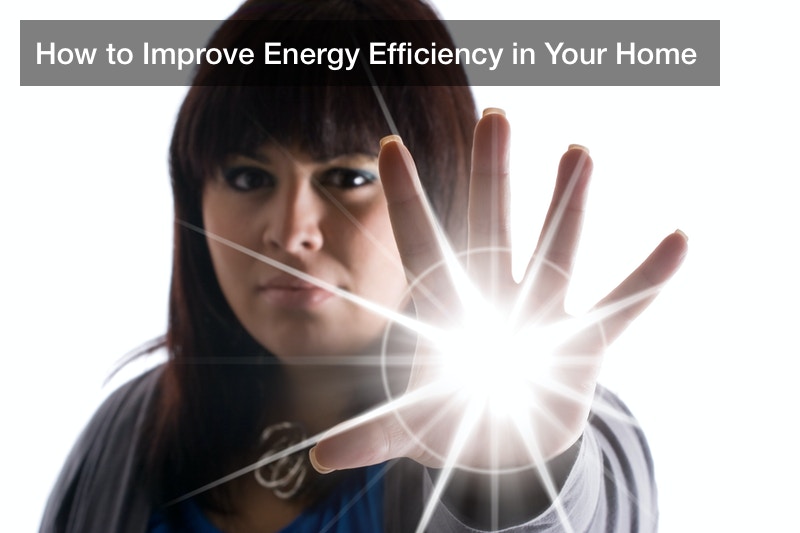
The use of clean renewable energy to protect the environment is becoming more important than ever before. According to a recent article from Solar Power World Online, The Solar Foundation and the Interstate Renewable Energy Council recognize this increasing demand and have merged together to accelerate progress in this area for the future. If you are concerned about the environment, there are things you can do as a homeowner to become more energy efficient. Improving energy efficiency in your home can have a significant impact on your household budget and your home’s value as well as the environment. Here’s what you can do to improve energy efficiency in your home.
The Design of Your Home

One of the first things to consider with energy efficiency in your home is residential renovations in its overall design. Homeowners spend a significant amount to improve their home. For example, overall spending for home improvement increased by 14% in 2017 alone and continues to rise. Before spending money on remodeling, have an energy audit performed on your home to help you determine the best areas to help cut costs. Your utility company may offer this service free of charge.
Once you know where your energy leaks are, you may want to consult with a home design and remodeling expert to help improve your home’s layout. Every aspect of your home can be altered for energy efficiency. This expert professional can help you determine the best options for energy efficient design, depending on your household budget. If you have goals for expansion in the future, you can receive expert advice on how to make the most out of your project. With green remodeling, you can save up to 75% on your annual energy bills.
The Systems Supporting Your House
One of the best major ways to boost energy efficiency in your home is to upgrade the systems supporting your house. One of the biggest infrastructures to focus on regarding energy efficiency is support plumbing systems. Items such as toilets and showers can be upgraded to reduce power and water usage. Replacing old and damaged piping can help improve water delivery and reduce overall energy costs. Using a tankless hot water heater or solar-assisted hot water heating can prevent up to 60% of yearly losses in water heating costs.
Inspect your home for water leaks caused by faulty pipes and have them repaired. Replace the grout and caulk around bathtubs and floor tiles to prevent water leaks. Lower the water temperature by a couple of degrees to reduce the time it takes to heat the water. Limit the amount of time you take for showers and baths and turn off faucets when brushing your teeth. Upgrade your faucets and shower heads to control water usage every time they are turned on.
Another area that can help with energy efficiency in your home is your electrical system. With professional residential electrical services, you can improve your home’s electrical wiring and lighting systems to save money every month. Licensed electricians can install smart home devices to help you control monthly energy use. Upgrading your electrical panel and installing more outlets can boost the flow of electricity directly where you need it most. A consultation can help you get expert advice on how to best maximize your home’s electricity.
Repairs That Can Improve Energy Efficiency in Your Home

There are certain repairs you can do to enhance energy efficiency in your home as well. One common source of energy loss is your roof. Having roof repair and inspections done can protect against 25% of heat loss for your home. Check to make sure your roof has enough adequate insulation. Installing a cool roof can help reflect sunlight to keep your home cooler. Make sure to fully close off and seal your chimney damper during the summer months and repair any cracks or gaps.
The water heater should be inspected at least once a year to keep optimal levels of energy efficiency in your home. You may need water heater repair or replacement if it’s over 10 years old. Consider adding an insulating blanket to your water heater to help prevent heat loss. Insulating tape around hot water lines and foam sleeves can help reduce annual water heating costs by up to 9% on average. Use on-demand hot water circulating pumps and reduce the temperature in your water heater to better control energy costs.
You may also want to review your boiler timer settings. Many modern boilers feature settings to adjust the timer for different days. You can set the timer to turn off during times you know you won’t be home during the week. The timer can also be set to turn on for only a certain amount of time at the beginning and end of each day. Programming can be done through a digital programmer or through an app on your phone.
Insulate Your Entire Home
Insulation can vastly improve the energy efficiency in your home. Approximately 35% of your home’s heat can be lost without adequate insulation. Insulate both exterior and interior walls as well as your garage door and walls to protect against air drafts. A rain-screen cladding system combined with an exterior insulation system can provide both acoustic and thermal insulation and eliminate problems with condensation. The type of insulation you’ll need depends on the region in which you live and your overall household budget.
Insulating floors can prevent 10% of heat loss from escaping. If you don’t insulate properly, your HVAC system can overheat and create costly repairs. Insulating your attic can boost the value of your property by $1,500 on average. Air seal your basement where gaps from piping can create more air leakage. Inspect the foundation around your home and use spray foam insulation to seal any gaps and caulking to repair cracks. You may want to consult with a foundation repair expert if you notice substantial damage.
Major Add-Ons to Consider

One of the major add-ons you may want to consider to boost energy efficiency in your home is inserts for fireplaces. These inserts are designed to reduce heated air loss through fireplaces and ensure proper ventilation. When your fireplace isn’t in use, make sure the damper is closed. When the fireplace is in use, keep all the doors closed leading out of the room to prevent heat from escaping. Make sure to have your chimney professionally cleaned to help the fire burn more efficiently.
One of the best ways to boost energy efficiency in your home is to install solar panels. These panels installed by a solar company can produce up to 75% of your home’s power free of charge. You can even make money by selling off excess energy to your utility company. The different types of materials and wiring used in solar panels vary widely among manufacturers. Look for solar panels with a maximum production or offset if you want to save the most on electricity usage.
Smaller Add-Ons to Think About
Older windows can cause your heating and air conditioning systems to work harder by allowing air leakage in and out of your home. This can cause a significant rise in your energy bills each month. By replacing them with energy efficient windows, you can save around 12% on your monthly energy bills. Consider purchasing windows with a high Energy Star rating to keep your home temperature levels comfortable in any season. Boost their energy efficiency with weatherstripping and storm window installation.
Use smart technology to improve energy efficiency in your home for lighting, thermostat settings, and appliances. Upgrade your appliances to ones that are more energy efficient. Use thick curtains on windows and draft excluders at the bottom of doors to trap heat. When remodeling, purchase recycled building materials to reduce the amount of energy used to produce new materials. Consider purchasing a generator to use in case the power goes out during inclement weather.
Routine Tasks to Perform

Your heating and cooling system has a significant impact on energy efficiency in your home. Furnaces and air conditioners account for approximately 43% of your energy bill. Replacing an HVAC system that is over 12 years old alone can save you around 30% of your energy bill. When purchasing a new furnace or air conditioner, look for one that has a high Energy Star rating and seasonal energy efficiency ratio. Have your heating and cooling systems inspected annually and change filters about every three months to keep them running smoothly.
Use cold water when washing your clothes and run full loads during off-peak hours. Invest in a smart leak detector to prevent water waste. Keep your dryer duct and lint screen clean. Use pre-cut foam baskets or child safety plugs to stop air leaks in outlets, especially along exterior walls. Unplug appliances when not in use and plug them into power surge protectors.
There are many little things you can do in the kitchen that can make a big difference with the energy efficiency in your home as well. Use pots that match the size of your stove’s burners to avoid wasting heat, and use convection ovens for smaller meals. Air-dry dishes and cover food when storing it in the refrigerator. Clean the condenser coils on your refrigerator twice a year and make sure the door seals are airtight. Set the refrigerator temperature between 35 to 38 degrees Fahrenheit and your freezer to zero degrees Fahrenheit for storage on a long-term basis.
Make Your Landscaping Energy Efficient
Your landscaping can make a big impact on the energy efficiency of your home. One way you can reduce your energy usage is by planting a circle of trees with leaves around your home. This will help block winter winds and provide plenty of shade to keep your home cooler. Make sure that any windows facing east or west receive enough shade to block direct sunlight from hitting your home. Place plants approximately three feet away around your air compressor to help keep your home cool.
Plant a row of shrubbery about a foot away from your home to act as an extra layer of insulation. Planting trees and shrubbery can provide a number of environmental benefits for your home besides energy conservation. The greenery can help control water erosion in your soil that can cause damage to your property and clean the air around your home. It can also help boost your overall property value. Water your lawn early in the morning to cut down on water usage.
Install Energy Efficient Doors

Doors can often be overlooked when looking at ways to improve energy efficiency in your home. Poorly insulated doors can let in air drafts and raise your monthly energy bills. Doors have energy efficiency ratings similar to windows. When upgrading your doors, look for ones that have an A++ rating for optimal efficiency. Fiberglass and steel entry front doors can save you up to 35% on your total energy bills. If you can, create a double-door airlock by adding a second door a few feet inside of your original door to reduce air loss when people enter and exit your home.
You may also want to consider upgrading your garage door to improve the energy efficiency in your home. Choose a garage door that has a high R-value for greater insulation. The door should have a low U-value for better thermal efficiency with heat flow. There are a variety of styles and materials you can choose for your garage door, depending on your budget. Make sure your new garage door fits properly and there is no air leakage that can cause energy loss.
Improving the energy efficiency in your home saves you money and increases its value while making you more comfortable. Take advantage of special federal tax incentives to help pay for the energy efficient upgrades you need. There are plenty of finance options as well to cover upfront incurring costs. By making energy efficient upgrades, you can significantly decrease your carbon footprint and earn money from your home through excess energy production. Get started making your home more energy efficient today!




Leave a Reply
You must be logged in to post a comment.